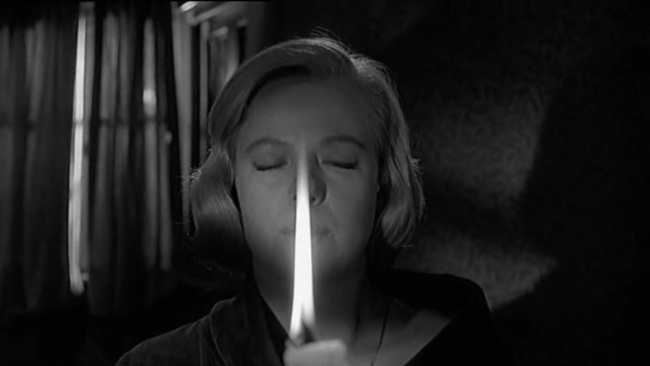“Post-Cinema” and More

A “collection of new image-making practices, technologies, and conditions of viewing embody a new era of the cinematic,” writes Holly Willis for the Los Angeles Review of Books. “And right along with these changes, a spate of recent books arrives to consider some of these shifts, grappling to find new words and conceptual paradigms adequate to name the tumult we call present-day cinematic art. ‘Post-cinema’ has become the catch-all term to designate these changes and refers not just to new filmmaking techniques but also to a sense that our world and its flows of money and power have become too abstract to represent visually. Instead, we feel this kind of cinema: it feels disembodied, precarious, virtual, violent, and, on occasion, thrilling, provocative, and beautiful.”
The books she writes about here are Steen Ledet Christiansen’s Drone Age Cinema: Action Film and Sensory Assault;Compact Cinematics: The Moving Image in the Age of Bit-Sized Media, edited by Maria Poulaki and Pepita Hesselberth; and Evan Calder Williams’s Shard Cinema.
More Reading
“It was only recently that I saw, for the very first time, Bryan Forbes’s adaptation of Mark McShane’s novel Séance on a Wet Afternoon (1964) [image above], and as it was designed to do, it chilled me to the bone.” So begins a piece by Dennis Cozzalio for Trailers from Hell about how the film resonates with his twenty-year struggle to cope with a deeply painful personal loss.
In the wake of this past weekend’s violence in Charlottesville, a clip from Don’t Be a Sucker, “a short propaganda film made by the U.S. War Department in 1943,” has gone viral, and Atlantic associate editor Robinson Meyer writes about the full seventeen-minute film: “It seems to know how democratic solidarity falters, how prejudice and factionalism can fracture a nation, and how all these forces might manifest in the United States of America. This wisdom may have emerged from simple practicality . . . Building a diverse commonwealth has never been just an idealistic aspiration or moral avocation. It has been a requirement of the republic’s survival—the sole remedy to the cancer of white supremacy.”
“Online, they call it ‘ruin porn,’” writes Ellen E. Jones in the Guardian, “a 2010s photography trend that has inspired gallery exhibitions, clickbaity listicles and academic theses with titles such as The Anxiety of Decline. Yet cinema’s fascination with disused buildings, like the one in the new Venezuelan feature by Jorge Thielen Armand goes much deeper. The dreamy La Soledad manages to be as confrontational and vitally political as a slasher flick set in those unoccupied properties near Grenfell Tower would be.”
Apropos of nothing much, here are the opening lines of John Ashbery’s prose poem “The Lonedale Operator”: “The first movie I ever saw was the Walt Disney cartoon, The Three Little Pigs. My grandmother took me to it. It was back in the days when you went ‘downtown.’ There was a second feature, with live actors, called Bring ‘Em Back Alive, a documentary about the animal tamer Frank Buck. In this film you saw a python swallow a live pig. This wasn’t scary. In fact, it seemed quite normal, the sort of thing you would see in a movie—‘reality.’”
And then there’s “They Knew What They Wanted.”
In Other News
Catherine Grant alerts us to a new project from the Derek Jarman Lab, the media hub at Birkbeck, University of London:
While working on our latest film, The Seasons in Quincy (2016), we came across two fascinating films from the late 1980s that feature Tilda Swinton and John Berger. Peter Wollen’s Friendship’s Death (1987) tells the story of an extra-terrestrial who comes to Earth to persuade human beings to reform to prevent their future self-destruction, while Timothy Neat’s Play Me Something (1989) is a film about a storyteller who tells a group of travelers a captivating tale about a romantic encounter in Venice. Since these films are rarely screened in the UK and are not available on DVD, we have partnered with the British Film Institute (BFI) to bring them to a wider audience.
“In a huge blow to ABC and Disney, the prolific television hitmaker Shonda Rhimes has signed an exclusive overall deal with Netflix,” reports John Koblin for the New York Times. “Ms. Rhimes, the creator of shows like Grey’s Anatomy,Scandal, and How to Get Away with Murder—all hits for ABC—will bring Shondaland over to Netflix in what the streaming service said was a multiyear deal.”
Goings On
Nathaniel Dorsky has announced that he and Jerome Hiler will be at the Harvard Film Archive on the weekend of October 13 through 15 to present three films by Stan Brakhage, “a slide lecture on Cinema before 1300” and Bagatelle II (2016) by Hiler, and the world premiere of three new films by Dorsky: Elohim,Abaton,Coda, and Ode. Dorsky will then head straight to Anthology Film Archives in New York to present those three new films on October 16 and 17.
Viewing
Luís Azevedo has a new audiovisual essay in the Notebook, Alfred Hitchcock Presents: A Trivial Pursuit (4’27”).
For news and items of interest throughout the day, every day, follow @CriterionDaily.



